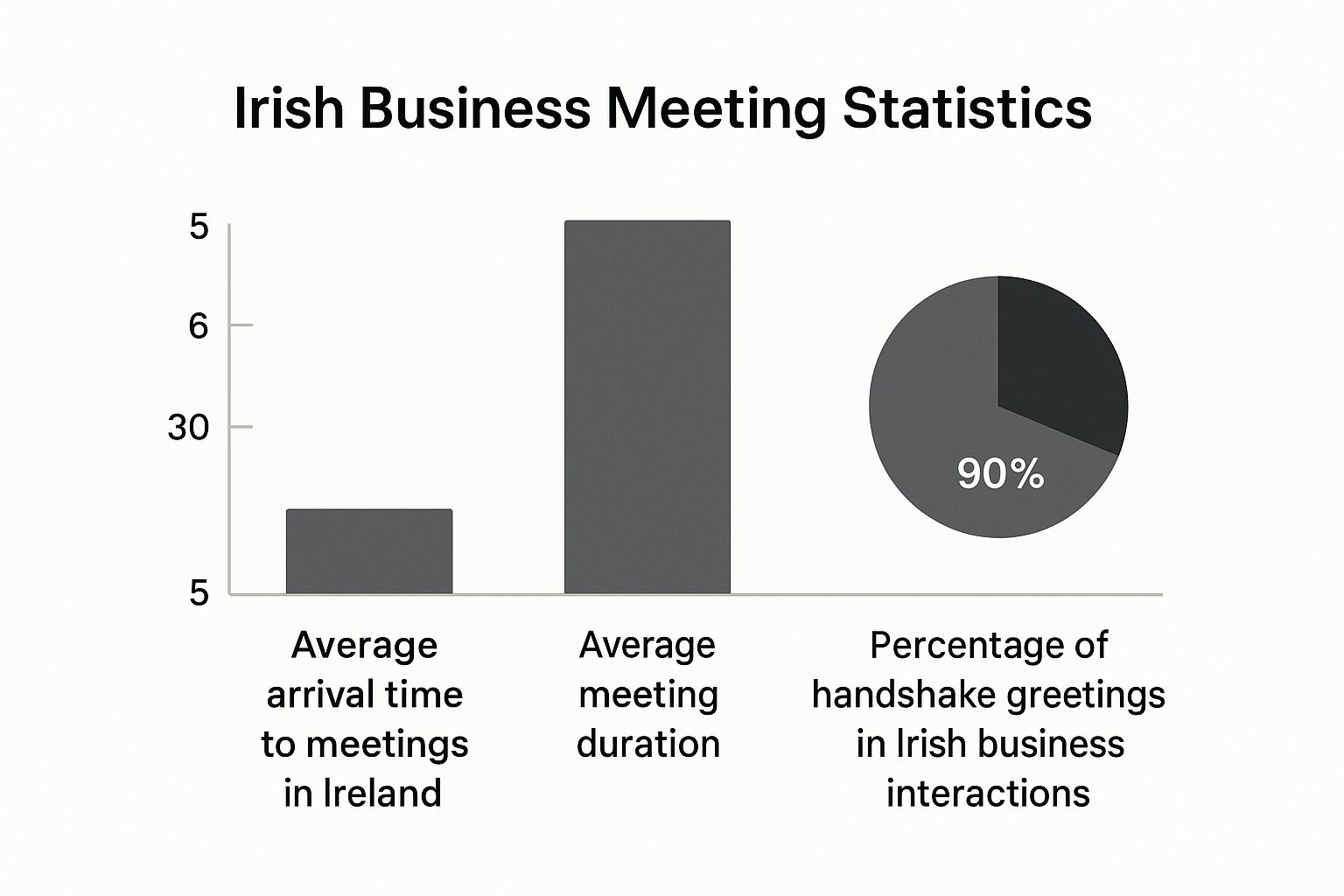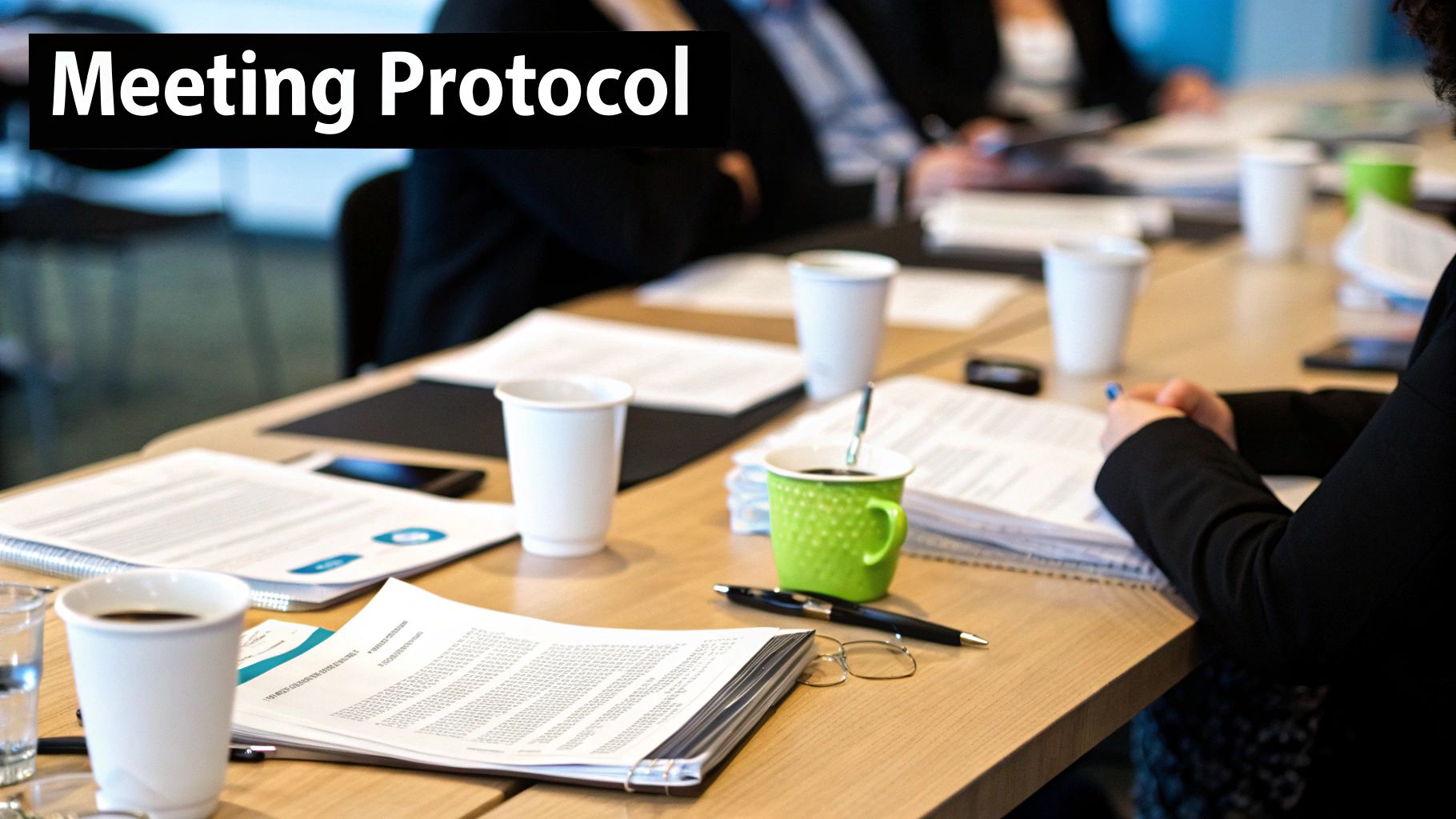In Ireland, the foundation of any solid business relationship is built on genuine connection, not a quick exchange of business cards. When you're trying to master Irish business etiquette, you need to understand that your first greeting isn't just a formal procedure. It’s the very beginning of a conversation, one that sets the stage for a lasting and productive partnership.
How to Make a Great First Impression in Ireland
Think of your first meeting in Ireland like building a bridge before you even start talking about how you'll cross it. Those initial moments are all about establishing rapport and trust, which are currencies just as valuable as the Euro in Irish commerce. This critical process kicks off the second you walk into the room.
A firm handshake paired with steady, friendly eye contact is non-negotiable. It’s a clear signal of your sincerity. In Irish business, this simple physical greeting is a surprisingly powerful indicator of trustworthiness. You have to find that sweet spot, though—too little eye contact can come across as shifty, while staring can feel aggressive or just plain rude. This nuance really speaks to the Irish preference for honest, respectful communication from the get-go.
Punctuality And Small Talk
Punctuality is a sign of respect, pure and simple. It shows you value your counterpart's time. Arriving about five minutes early for a meeting is a great rule of thumb; it signals that you’re serious and well-prepared. It also gives you a moment to relax and ease into the conversation without feeling rushed.
This image breaks down some of the key metrics around timing and greetings in Irish business culture.

As you can see, arriving a bit early, expecting meetings to last about an hour, and always offering a handshake are fundamental to making a great first impression.
Once the handshakes are done, fight the urge to dive straight into your pitch. Instead, take a few minutes for some light, neutral small talk. It’s an essential part of the process.
Safe and effective topics usually include:
- Your travels: Briefly mentioning your journey or asking about their favorite travel destinations.
- Sports: Especially Gaelic games or rugby, which are massively popular and a great way to connect.
- The local area: Complimenting the scenery or asking for a recommendation for a good pub or restaurant.
To help you navigate these crucial first moments, here's a quick rundown of the dos and don'ts.
Key Dos and Don'ts for Initial Greetings
| Action | Do | Don't |
|---|---|---|
| Handshake | Offer a firm, confident handshake. | Give a weak handshake or avoid it altogether. |
| Eye Contact | Maintain steady, friendly eye contact. | Stare intensely or constantly look away. |
| Punctuality | Arrive about 5 minutes early. | Show up late or exactly on time, feeling rushed. |
| Small Talk | Engage in light, neutral conversation first. | Jump straight into business topics. |
| Formality | Use titles (Mr./Ms.) until invited to use first names. | Assume immediate first-name basis. |
| Personal Space | Respect personal space; don't stand too close. | Be overly familiar or physically intrusive. |
Mastering these small but significant actions demonstrates cultural awareness and a genuine interest in building a real connection, not just closing a deal.
This initial chat isn't just idle pleasantry; it's a strategic part of the relationship-building dance. It shows you see them as a person, not just a potential transaction, and it aligns perfectly with the collaborative spirit that drives Irish business.
This conversational, person-first approach should carry through all your communications, including your emails and messages. To make sure your written outreach hits the right note, it’s always a good idea to brush up on general professional email writing tips. It's also critical to know how to adjust your messaging for the local culture; you can learn more about that in our guide on localizing B2B messaging for the Irish market. By focusing on these personal touches from the very start, you set a positive and productive tone for any partnership that follows.
Understanding the Irish Communication Style
In Ireland, conversation is more than just swapping information; it's practically an art form. If you want to get anywhere in Irish business, you need to understand that what isn't said can be just as important as what is. Forget blunt, straight-to-the-point chats. Professional dialogue here is a delicate dance, weaving together humor, storytelling, and a healthy dose of indirectness.
Think of it this way: a direct "no" can come across as harsh or even confrontational. Instead, you're far more likely to hear a softened response like, “That’s an interesting point, we’ll have to give it some thought,” or “Let me see what can be done.” These aren't brush-offs. They are polite ways to signal potential disagreement while keeping the relationship smooth. Learning to read between these lines is absolutely crucial.

The Role of Humor and Storytelling
Humor is a fundamental part of the Irish communication toolkit. It’s used to build rapport, break the ice, and even defuse tension when conversations get a bit tricky. Self-deprecating wit is especially common—it’s a way of showing you’re humble and approachable. A business partner who can laugh at themselves is seen as trustworthy and down-to-earth.
Storytelling is also woven deep into the fabric of the culture. Don't be surprised if a serious business discussion takes a brief detour into a seemingly unrelated anecdote. This isn't a waste of time; it's a way to add context, illustrate a point, and build a more personal connection. Your job is to listen and show you're genuinely interested. These are the moments where real, trust-based professional bonds are actually formed.
"The Irish have a unique talent for weaving tales that capture the imagination and reflect the country's rich heritage."
This quote really gets to the heart of it. By embracing this conversational style instead of trying to rush to the next agenda item, you’re showing you respect the way business gets done here.
Navigating Indirectness and Subtlety
The Irish communication style prizes politeness and preserving relationships above almost everything else. This often leads to a more indirect approach, particularly when you're dealing with sensitive topics or giving negative feedback. It's all about 'reading the air' to grasp the real message.
To pull this off, here are a few pointers:
- Listen for what's implied: Pay close attention to tone of voice, body language, and what is strategically left unsaid.
- Ask open-ended questions: Instead of a direct "Can you meet the deadline?" which can feel like an accusation, try something like, "How are we feeling about the timeline for this project?" This opens the door for a more nuanced, honest answer.
- Avoid putting people on the spot: If you need a firm commitment, it's often better to ask for it in a follow-up email rather than in a group meeting where someone might feel cornered.
This approach might feel a lot less direct than what you’re used to, but it’s absolutely central to effective Irish business etiquette. Soften your own communication style, lean into active listening, and you'll find that routine conversations can become powerful opportunities for building solid, lasting partnerships.
Leading a Successful Irish Business Meeting
An Irish business meeting can catch you off guard if you’re used to a strictly by-the-book corporate procedure. It feels less like a rigid boardroom event and more like a structured, yet surprisingly fluid, conversation. To navigate it well, you need to understand that the human element is just as vital as the agenda itself.
Think of the formal meeting as the next chapter in the relationship you’ve already started building. Those first few minutes are your last chance for some light chat, which is critical for setting a friendly and collaborative tone before you get down to the nitty-gritty.
While you'll almost always get an agenda, see it as a flexible roadmap, not a strict timetable. The discussion might drift to different points as the conversation flows. Letting this happen is a key part of Irish business etiquette—it’s where the real progress is often made.

The Meeting Dynamic
Once you're into the business end of the meeting, the atmosphere is all about politeness. Everyone gets their moment to speak, and they expect to be heard with respect. Interrupting someone or coming in with overly aggressive tactics will backfire. Spectacularly.
The goal here isn't to overpower the other side but to build a case and arrive at a decision through open discussion. This approach creates a sense of true partnership, which is no accident. It’s all rooted in a culture that prizes relationships, trust, and honest communication—values forged by deep historical and social factors.
Because of this, boastful or domineering behavior is a major turn-off. Business integrity and cooperation are the bedrock of any successful deal in Ireland.
In the Irish meeting room, consensus is the ultimate prize. Decisions are rarely made by a top-down command. Instead, they emerge from a collective agreement built through respectful dialogue and mutual understanding.
This collaborative process might take longer than you’re accustomed to, but the result is stronger buy-in from everyone involved. It also lays the foundation for a much more resilient, long-term partnership.
Reaching a Conclusion and Next Steps
As the meeting starts to wrap up, resist the urge to push for an immediate, on-the-spot final decision, particularly on complex issues. It’s completely normal for your Irish counterparts to want to take the details away and discuss them internally before giving you a firm commitment.
To handle this part of the process smoothly, here's what to do:
- Summarize Key Points: Quickly recap the main discussion points and any tentative agreements. This ensures everyone is leaving with the same understanding.
- Define a Clear Follow-Up: Propose a clear, low-pressure timeline for what comes next. For instance, say something like, “We’ll send over the revised proposal by Wednesday. Would Friday be a good time for a brief call to go over it?”
- End on a Personal Note: Finish with another firm handshake and a bit of friendly closing chat. You’re not just closing a meeting; you’re reinforcing the personal connection you’ve worked to build.
This patient, relationship-first mindset is absolutely central to doing business in Ireland. For anyone looking to grow their presence here, mastering these nuances is critical. If you're serious about scaling, you might also find value in our complete framework for scaling B2B sales in Ireland, which dives deeper into these cultural principles.
Negotiating Deals and Making Decisions
If you're used to high-pressure, "sign on the dotted line" sales tactics, you'll need to leave those at the door when you land in Ireland. Here, trying to force a quick win is the fastest way to get no deal at all. Negotiation is a marathon, not a sprint, and it's built entirely on the trust and rapport you've spent time building.
Think of it less like a battle and more like two parties working together to build something. The goal is to construct a deal collaboratively, not to strong-arm your counterpart into submission. This means you need to be flexible. Coming in with rigid demands or pushing for immediate answers will feel abrasive and can easily shatter the goodwill you’ve worked so hard to establish.
Building a Case Collaboratively
The Irish approach to business is deeply consultative. Decisions are rarely made by one person in the heat of the moment. Instead, you should fully expect your contacts to take your proposal back to their team to hash it out and build a consensus. Don't mistake this for a delay tactic; it’s a sign of respect for the process and their colleagues.
When you lay out your proposal, frame it as a solution to a shared problem. Focus on the mutual benefits and show how everyone comes out ahead. If they raise objections, handle them calmly and without getting confrontational. Show them you're willing to meet in the middle.
A few things to keep in mind:
- Patience is a virtue (and a strategy): A final "yes" will almost certainly take several conversations. Rushing things signals that you only care about the transaction, not the long-term relationship.
- Ditch the hard sell: Aggressive closing techniques, ultimatums, or "this offer expires in 24 hours" pressure are considered rude and will be met with a firm wall of resistance.
- Fairness is everything: Constantly emphasize how the deal is equitable for both sides. The "win-win" concept isn't just a cliché here; it's a fundamental expectation of Irish business etiquette.
If there's one thing to take away, it's that the Irish prize long-term partnerships far more than short-term gains. Your willingness to engage in patient, respectful dialogue proves you’re a reliable partner, not just another vendor looking for a quick sale.
This thoughtful, relationship-first mindset is exactly what key decision-makers, like financial executives, look for when they're vetting new partners. Our guide on what financial executives want from B2B vendors dives deeper into this very topic.
Ultimately, your success hinges on your ability to adapt to this collaborative style. It demonstrates that you get it—that in Ireland, how you reach an agreement is every bit as important as the agreement itself.
Business Entertaining and Social Etiquette
In Ireland, don't be surprised if some of the most important business happens far from a boardroom. Social settings like a business lunch or, more famously, a trip to a classic pub aren't just polite afterthoughts. They are often the main stage for building the personal connections that really matter in Irish business.
These get-togethers are almost never about closing a deal right there on the spot. Think of them as the groundwork. The real goal is to build rapport and establish a sense of mutual trust. A business lunch is a conversation that happens to have a meal alongside it, not a meal that gets interrupted by a sales pitch. The focus is on getting to know each other as people, finding some common ground, and showing that you value the relationship itself, not just the transaction.
Navigating the Pub and Paying the Bill
The pub has a truly special place in Irish life, both socially and for business. If your Irish counterpart invites you to the pub, take it as a great sign. It means they're comfortable with you and want to move the relationship beyond the formal office setting. It's a relaxed space where the corporate masks can come off.
Keep the conversation light and easy. Great topics are sports (especially rugby and Gaelic games), travel, or general hobbies and interests. It's best to steer clear of anything too personal or potentially divisive, like politics or religion, unless your host is the one to bring it up.
When the bill comes, the etiquette is refreshingly simple: the person who did the inviting is expected to pay. If you ask a contact out for lunch, you should take care of the bill without any fuss. Trying to split it can create an awkward moment, so if you're the one being treated, just accept with a gracious thank you.
A core concept you need to get your head around is the "round." In a pub, people almost always take turns buying a round of drinks for the whole group. Joining in and buying your round is a powerful, unspoken signal that you get it—you respect the camaraderie and fairness that underpins the social contract.
Alcohol and Professionalism
While a pint is a common part of socializing for business, remember that moderation is key. It's perfectly normal and often quite smart to make one pint last the whole evening. The aim is to be sociable and part of the group, not to match everyone drink-for-drink.
It's also completely fine to say no to alcohol. Your hosts won't be offended in the slightest if you order a soda or a coffee instead. What they'll remember is your professionalism and your ability to hold a good conversation.
Getting this social side of things right shows you understand a fundamental truth about business in Ireland: strong professional partnerships are built on a foundation of genuine human connection. These interactions aren't just filler; they are a critical part of doing business here. Often, the relationships you start in a pub can be strengthened at larger industry events. You can get a sense of the key networking opportunities by checking out our guide on the top B2B sales conferences in Ireland.
Common Questions About Irish Business Etiquette
Stepping into a new business culture can feel like you’ve been handed a puzzle with a few key pieces missing. To help you put it all together and walk into your next meeting with confidence, we’re tackling some of the most common questions about the ins and outs of Irish business etiquette.
These aren't textbook definitions; they're practical answers to the little things that can make a huge difference in your interactions.

Think of this as your cheat sheet for avoiding common slip-ups and connecting with your Irish colleagues on the right foot.
What Is the Appropriate Dress Code?
The business dress code in Ireland is generally conservative, though it's loosened up quite a bit in recent years, especially inside the country's booming tech scene. For your first few meetings, it’s always smart to err on the side of caution. Think formal.
For men, that means a dark suit and tie. For women, a business suit or a smart dress is a safe bet.
Once you’ve built a relationship and have a feel for the company's vibe, you can adjust your wardrobe. In many modern offices, a "business casual" look—like trousers or chinos with a collared shirt or blouse—is the daily norm. But if you’re heading into a formal presentation or a critical negotiation, always dress up. It’s a clear sign of respect.
Is Gift-Giving Expected in Business?
Gift-giving is definitely not a standard part of doing business in Ireland. In fact, showing up with an expensive gift, especially early on, could create an awkward moment or even feel like you’re trying to buy influence. The truth is, a strong personal connection is worth far more than any physical present.
If you really want to mark a special occasion, like closing a big deal or thanking a host, just follow a few simple rules:
- Keep it modest. A quality pen, a book about your home country, or a nice bottle of whiskey are all perfectly fine.
- Company-branded items work well. Anything with your company logo is seen for what it is—promotional—and is generally acceptable.
- It’s the thought that counts. The appropriateness of the gift is much more important than its price tag.
Honestly, a simple, heartfelt thank-you note after a great meeting often makes a bigger and better impression than a lavish gift.
A key takeaway for anyone doing business in Ireland is that relationships are the most valuable currency. Focus on building trust and rapport through genuine conversation and mutual respect, rather than relying on material gestures to make an impression.
How Should I Address My Counterparts?
When you first meet someone, it's best to use their formal title (Mr., Ms., Dr.) and their last name. It’s a simple way to show professional respect right from the start. So, if you're meeting John Murphy, you'd start with "Mr. Murphy."
That said, the Irish are known for being friendly and informal. It’s very likely you’ll be invited to use first names almost immediately, often during that very first meeting. Once they extend that invitation, feel free to switch. This shift from formal to informal is a great sign that you're building rapport successfully.
What Topics Should I Avoid in Conversation?
While the Irish are masters of conversation, there are a couple of sensitive topics you’ll want to steer clear of, especially when a business relationship is new. The big ones are politics and religion, and you should be particularly cautious around discussions of "The Troubles" in Northern Ireland. These subjects are complex and deeply personal, so it's best to let your Irish colleagues bring them up, if they choose to.
Similarly, try to avoid making direct comparisons between Ireland and the UK. Ireland has a fiercely proud and distinct national identity, and lumping the two together can come across as ignorant. Instead, stick to safe, positive ground. Topics like sports (especially rugby, a national passion), travel, food, and Ireland’s incredible scenery are all great ways to build a connection without accidentally causing offense.
As you build your team, understanding these cultural nuances becomes even more important. For deeper insights, you might be interested in our guide on how to build and manage a remote SDR team in Ireland, which explores these dynamics further.
